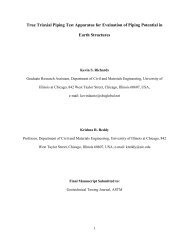Toward a Useful Theory of Mentoring: A Conceptual Analysis and ...
Toward a Useful Theory of Mentoring: A Conceptual Analysis and ...
Toward a Useful Theory of Mentoring: A Conceptual Analysis and ...
You also want an ePaper? Increase the reach of your titles
YUMPU automatically turns print PDFs into web optimized ePapers that Google loves.
programs place more value on mentor traits (e.g. gender <strong>and</strong> rank) than behavior (Smith<br />
et al., 2005). Our decision to define mentoring in such a way as to disqualify formal<br />
mentoring contains no judgment about the thous<strong>and</strong>s <strong>of</strong> formal mentoring programs that<br />
have been set up in organizations. We view formal mentoring programs as sewing the<br />
seeds <strong>of</strong> relationships, many <strong>of</strong> which flower into useful <strong>and</strong> productive mentor<br />
relationships.<br />
A second stipulation <strong>of</strong> our definition is that there is a transmission <strong>of</strong><br />
knowledge, social capital, <strong>and</strong> psycho-social support that is related to work. It is <strong>of</strong>ten<br />
noted that mentoring relationship can include an element <strong>of</strong> socio-emotional support that<br />
has nothing to do with any cognitive notion <strong>of</strong> knowledge. We agree that this is <strong>of</strong>ten a<br />
concomitant <strong>of</strong> mentoring relations, <strong>and</strong> <strong>of</strong>ten a very important one, but it is neither<br />
necessary nor sufficient for mentoring. If one receives only socio-emotional support then<br />
one does not have a mentor, one has a friend. By contrast, if one respects a mentor, but<br />
does not consider the mentor a friend <strong>and</strong> receives little or no socio-emotional support,<br />
one can nonetheless prove a valuable source <strong>of</strong> organizational <strong>and</strong> career knowledge. To<br />
be sure, there is some level <strong>of</strong> social ingratiation required for any relationship (including<br />
mentoring) to work. One cannot despise a person <strong>and</strong> work effectively with that person as<br />
a protégé. But the friendship <strong>and</strong> emotional minimum seems to us a low one.<br />
“When does mentoring begin <strong>and</strong> end?” This issue remains troubling because it<br />
is in part one <strong>of</strong> quanta. It is easy enough to say that mentoring does not begin until (1)<br />
the knowledge <strong>of</strong> interest (or the social capital <strong>and</strong> network ties) has begun to be both<br />
transmitted <strong>and</strong> received <strong>and</strong> (2) the two parties recognize the role. But the end <strong>of</strong> the<br />
mentoring relationship is a function <strong>of</strong> two factors, each potentially measurable but<br />
20



